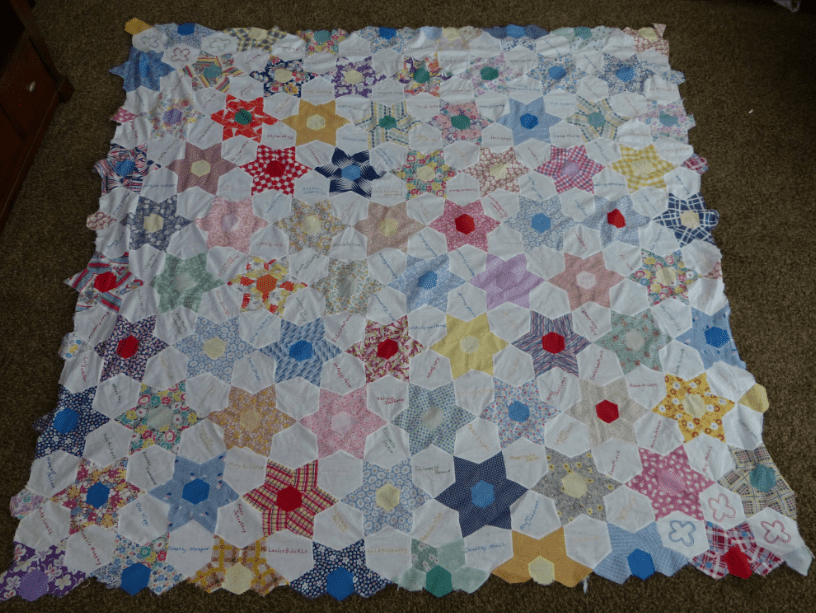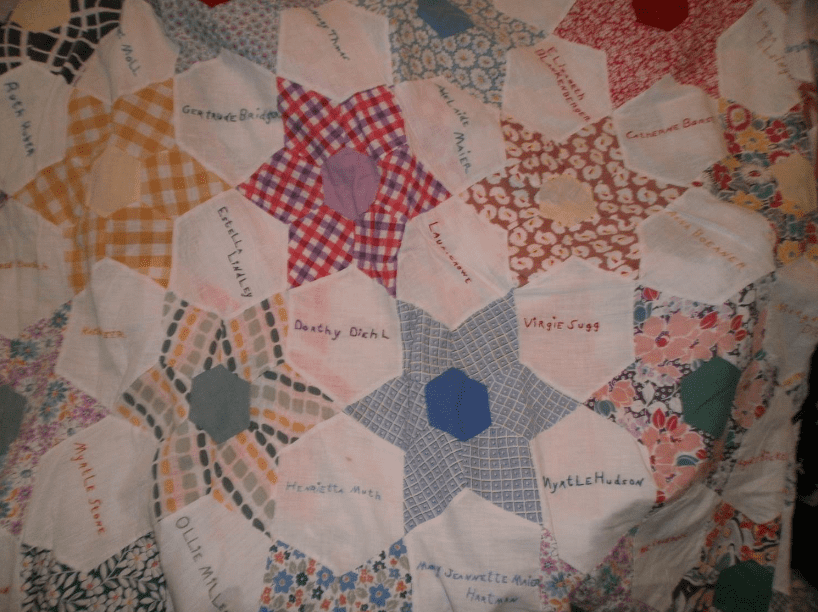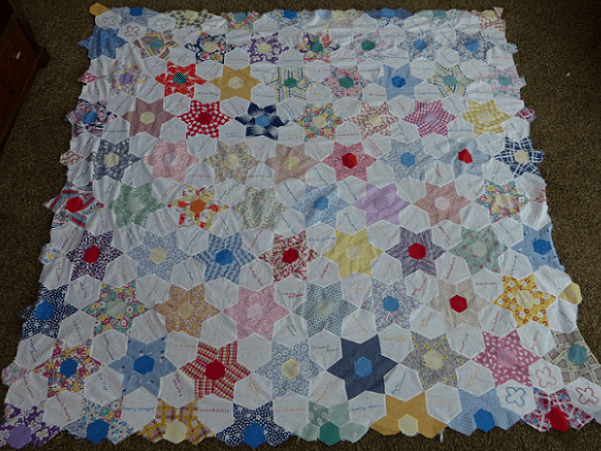Introduction: In this article, Gena Philibert-Ortega searches old newspapers to learn more about a woman’s name she found embroidered on a quilt she bought in an antiques shop. Gena is a genealogist and author of the book “From the Family Kitchen.”
My genealogy research sometimes has nothing to do with my own ancestors. I enjoy projects that document women’s lives based on material artifacts I purchase from antique stores. One such artifact is a quilt top that I purchased a number of years ago.

This 1930s-era quilt top was never completed, but it includes the names of various women embroidered on white hexagons that outline colorful fabric stars. Because I have an interest in “signature quilts” (quilts that have the names of either the women involved in making the quilt or those who paid to have their name included for fundraising purposes), I wanted to know more about this one. My research questions include: Who were these women? How did they know each other? Who started this quilt top and why?

That ongoing research involves tracing each woman represented on the quilt. I’ve worked on this project just as I would for a typical family history project, searching sources like the U.S. census, city directories, and old newspaper articles. Using a spreadsheet to list these women and their corresponding facts, I eventually learned what tied these women together: they worked or had a connection to the H. Fendrich Cigar Factory in Evansville, Indiana.
There are still many unanswered questions about this quilt – but I’m hoping eventually, as I learn about each woman’s life, I may in turn come up with more answers.
One woman whose name is inscribed on the quilt is Clara Gresham.
How I researched her life is a good example of how we discover the details of our ancestors’ lives – especially their stories as found in the pages of old newspapers like GenealogyBank’s Historical Newspaper Archives.
Clara Gresham & Her Employment History
Her name, stitched on the quilt in blue thread, is simply “Clara Gresham” – but she started life on 27 January 1903 as Clara Vanderschmidt, born to Frank Vanderschmidt and Mary Vetter.* The 1920 U.S. Census shows that a 16-year-old Clara was working as a roller in the H. Fendrich Cigar Factory along with her sisters Delphine and Ardella.** This is not surprising since at one time U.S. cigar factories were a major employer of both women and teenage girls.
City directories indicate that Clara continued working in the cigar factory until at least 1947 in various positions, including cigar roller and stemmer. But she did not spend all of her working years at Fendrich. She spent her later years working as a cook in a private household (1948), maid at a hospital (1950), and eventually her last job, as a matron at Baker Avenue School.
Unfortunately, Baker Avenue School would also be the place where she would die.
Her Violent Death
On 25 April 1957 at about 4:30 in the afternoon, Clara was working at Baker Avenue School when her ex-boyfriend (newspaper accounts stated they dated 13 years, breaking up the month before the killing), William Jennings (Jim) Utley, confronted her about money he spent on parts for her car. That confrontation ended with the shooting death of Clara. Utley shot Clara at least five times, twice in the back. Clara’s family would later tell newspaper reporters that she was afraid Utley would kill her because he had threatened her numerous times.
Sometime after the shooting, a head custodian found Clara’s body and notified authorities. The following newspaper put the story on its front page, reporting that the arrival of police cars also meant the arrival of curious onlookers:
Most of the onlookers were school-age children, many of them students at Baker. Police were kept busy explaining that it was not known what had happened in the building and keeping a walkway to the school cleared for investigators.
Finding More of Her Story
From earlier newspaper research, I knew all of this when I began my current Clara research project about five years ago. But – as with any newspaper research – it’s important to keep checking back because more newspaper articles may have been added since you first searched a newspaper archive. One day I decided to look more into Clara’s life and happened upon an expose in GenealogyBank’s Historical Newspaper Archives.
The article, titled “Murder Trial: A Story of Justice in Action” in the Evansville Courier and Press, details for readers the criminal justice process, using Clara Gresham’s murder trial as an example.
This is the story of a criminal trial. Everyone who played an important role – the prosecutor, the judge, defense attorney, police, even the defendant – cooperated with the Evansville Courier and Press to give readers a picture of what goes on inside the courtroom as well as behind the scenes. Only the jury deliberations were secret and kept out of the newspaper article, as required by law.
Although this in-depth investigative reporting article was meant to educate readers about the criminal justice process in general, it actually provided an amazing amount of information about Clara’s death, her killer, and the subsequent trial. A newspaper article like this, that goes beyond simple reporting of the events to give the reader – and in my case, the genealogist – a look into what was going on at the time of this most hideous shooting is a valuable addition to your research.
The newspaper article even includes the questions posed by officers to Utley as they questioned him about what took place the day of Clara’s killing. While initially he claimed to know nothing about her death, Utley later admitted to killing her and detailed for the police what happened, including where he hid the bullet casings:
…I went in the back door and up the steps to the second floor where I met Clara Gresham. We got into an argument over tires and accessories which I had bought for her car when I was going with her. I pulled out the gun and said, ‘I have a good notion to shoot you.’ She started backing up and I commenced shooting.
Clara is buried at Saint Joseph Catholic Cemetery in Evansville, Vanderburgh County, Indiana, with a simple tombstone that provides her name, birth year, and death year. At the time of her death, survivors included her mother and siblings. Although previously married, it appears that Clara had no children.
Utley, despite pleading innocent by reason of insanity, was found by a jury to be guilty of second degree murder and sentenced in September 1957 to life in prison.
Keep Looking
Thanks to the additional newspaper research I did, I now have a fuller understanding of Clara’s life story.
Genealogy Tip: An important newspaper research tip I share with everyone is to keep looking. As more newspapers are digitized and become available online, you are likely to find more information about the person you’re researching.
————————–
* “Clara Vanderschmidt Gresham,” Ancestry.com. Indiana, Death Certificates, 1899-2011. (http://interactive.ancestry.com/60716/44494_351193-01392?pid=4258388&backurl=http://search.ancestry.com/cgi-bin/sse.dll: accessed 2 February 2017).
** 1920 U.S. census, Vanderburgh County, Indiana, population schedule, Evansville Ward 6, p. 11A, dwelling 239, family 263, Clara Vandersmith; digital image, Ancestry.com (http://www.ancestry.com: accessed 3 February 2017); citing NARA microfilm publication T625, roll 470.
